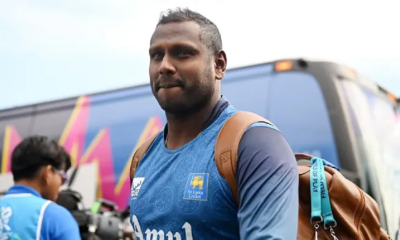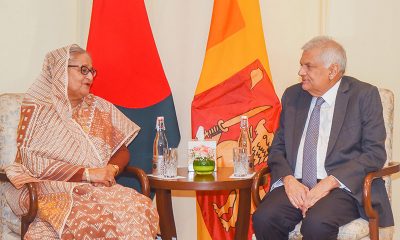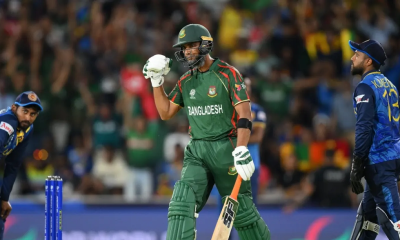Editorial
Tea snapshot

The publication of Merril. J. Fernando’s autobiography last month is a useful peg to hang a discussion on the Ceylon tea industry – we advisedly call it Ceylon tea rather than Sri Lanka tea – as the former is the name by which this unique product is known globally. Merril Fernando, of course, needs no introduction. He is very well known in this country as the creator of the Dilmah brand he coined from the names of his two sons, Dilhan and Malik, which he took to the world outside making it the best known nationally owned tea brand in Sri Lanka. As we said in a review of the book last Sunday, MJF is not the country’s biggest tea exporter but his is the best known nationally-owned brand of Ceylon tea in the tea drinking world.
During the British colonial years and the early post-Independence period, tea was our major export and foreign exchange earner. But decades ago garments overtook tea and also, remittances from blue collar workers striking out overseas to support their families back home became a reckonable factor in the country’s foreign exchange budget. Net earnings from tea, obviously, was far higher than what garments, that had by far become the country’s largest manufacturing industry fairly quickly, brought in. That was because the imported input into tea was a fraction of what the clothing factories had to import to manufacture their product. This included not only fabrics but much more. The labour was the major value adding factor in the domestic garment industry.
The major imported input into the tea industry is fertilizer. Like garments, tea growing too is a labour intensive industry. Onetime Finance Minister Ronnie de Mel who presented 10 national budget for the J.R. Jayewardene regime from 1977 to 1988 once famously said that Sri Lanka’s economy sits on a tripod of women workers – those slaving on the tea fields, working in the garment factories and venturing out as domestic servants largely to the Middle East. Never were truer words spoken. The British brought in indentured Tamil labour from India to work on their tea estates under harsh conditions because the upcountry peasantry was reluctant for various reasons to work on the plantations. These were created at tremendous environmental cost on land sold for a pittance under the infamous Waste Lands Ordinance of 1840.
This stipulated that “all forest, waste, unoccupied or uncultivated land was to be presumed to be the property of the Crown until the contrary is proved.” This resulted in the denuding of the country’s mountain slopes clothed with montane rain forests providing the sponge-like catchments for the rivers flowing through the valleys. The price paid was irreparable ecological damage to first plant coffee and then tea. The upcountry peasantry lost their common grazing land and much more to this despoliation that brought fame and fortune to British plantation owning companies quoted on the London Stock Exchange. Ceylon tea soon earned the reputation of being the world’s best and Merril. J. Fernando in his memorable over six decade long journey through the industry retains at age 92 a passion for the product that was the foundation of his success.
Apart from very readable accounts of his upbringing and early years covered in the book, Fernando has dwelt on the exploitation of Ceylon tea by the British whose chief focus was the bottom line. He writes that during the period of his training as a tea-taster in the UK he was greatly distressed “by the ruthless exploitation of our tea industry and its workers that took place in London.” He had developed a great respect for the British as a result of his friendship with many Brits resident her e as well as his employers who controlled much of the tea export trade. But all that was shaken when he realized what was being done in London to Ceylon tea by the British who dominated the global tea trade in Mincing Lane, “the world’s undisputed tea center controlling and manipulating the distribution and marketing of tea from grower countries.” He says that resulted in producers, especially those in Ceylon, being held to ransom adding that we were then more vulnerable to market manipulation than any other grower as about 90% of national production was being exported, a large proportion going to the UK.
A major service rendered to Ceylon tea by Merril Fernando was his resistance to efforts to make Sri Lanka a so-called ‘tea hub’ by importing cheap teas and blending them with Ceylon tea. This would have been a profitable business but at the cost of both the unique character and reputation of Ceylon tea. In the middle seventies, as result of the JVPs 1971 adventure attributed by the then rulers to land hunger, the land reform laws compelled the sale 150,000 acres of British-owned sterling estates at a price of Rs. 1,125 an acre (pounds 42 and 50 pence). It was agreed that the compensation would be “prompt, effective (meaning may be remitted) and adequate.” Payment was concluded over four years. Rather than alleviate land hunger, the plantations were vested in two monolithic state corporation, the Sri Lanka State Plantations Corporation and the Janatha Estates Development Board.
Despite the presence of 23 Regional Plantation Companies managing state-owned plantations leased to them in 14 regions, 70% of Sri Lanka’s tea is produced by nearly half a million smallholders mostly in the low country. Today the industry is hard-pressed for labour with the tea workers lot way below minimum norms. But the industry remains a vital segment of the Sri Lankan economy.
Editorial
Danger of weak drug regulation

Monday 22nd December, 2025
Maan Pharmaceuticals Ltd., the manufacturer of Ondansetron, which has been withdrawn from hospitals here pending a probe, is reported to have asked the Sri Lankan health authorities to have the drug tested by an internationally accredited laboratory. The use of nine other Maan products too has been suspended in Sri Lanka over quality concerns. Maan’s reaction has come as no surprise; all companies ardently defend their products. However, its concerns should be heeded. The National Medicines Regulatory Authority (NMRA) and the Ministry of Health ought to furnish irrefutable evidence in support of their decision to suspend the use of the drugs at issue. The manner in which the NMRA has carried out its duties and functions, especially granting approval for drugs and investigating complaints of their quality, over the years, does not inspire public trust.
The subtext of what has been reported of the Maan’s letter to the Sri Lankan health authorities is worth taking note of. It can be argued that in corporate newspeak, Maan has questioned the competence of the NMRA to test its products. As Maan would have us believe that its products meet international standards, it should be asked to state whether it has gained access to stringent regulatory destinations, such as the US and EU, and, if not, why.
It is being argued in some quarters that the degradation of pharmaceuticals can happen due to improper storage and transport. Maan’s aforesaid letter reportedly has reference to drug storage here. There are allegations that the Sri Lankan health authorities leave imported drugs in freight containers under inappropriate conditions for extended periods. However, the phials of Ondansetron which were tested at the Kandy National Hospital and found to be affected by microbial contamination had been stored properly and their seals were intact, according to media reports, quoting doctors. Thus, the contamination of the drug points to issues in manufacturing and packaging rather than storage and transport.
Meanwhile, a news item in this newspaper today reveals the pivotal importance the pharmaceutical industry has assumed in the Indian economy; India’s pharmaceutical exports have crossed USD 30 billion. Therefore, some critics of the Indian pharmaceutical products are of the view that India will do everything in its power to protect the interests of its drug companies, including Maan. But the fact remains that India itself has cracked down on some of its pharmaceutical companies involved in scandals. It severely dealt with the Indian companies that manufactured contaminated cough syrups which killed 66 children in Gambia in 2022 and 22 children in India in September 2025.
In the greed-driven corporate world, profits take precedence over human life, and there is hardly anything that Big Pharma spares in pursuing profit maximisation. As we pointed out in a previous comment, the World Health Organization has revealed that at least one in 10 medical products in low-and middle-income countries fails to meet quality standards or is falsified. This shows the enormity of the problem of fake and substandard drugs. Hence the need for robust mechanisms to protect patients.
All issues related to substandard and falsified drugs and their adverse effects in this country boil down to the failure of successive governments to address multiple problems pertaining to drug regulation and testing and find long-term solutions. Flaws in regulatory oversight and the absence of proper testing facilities have helped corrupt politicians and bureaucrats enrich themselves by turning this country into a dumping ground for poor-quality and fake medicines. Health Minister Dr. Nalinda Jayatissa himself has said that not all drugs approved by the NMRA undergo rigorous testing, and thorough tests are conducted on drugs only when there are complaints about their quality.
Most of all, the NMRA has to be cleansed, as a national priority. Its history is replete with numerous scandals, including allegations of corrupt drug registrations, data manipulation, issues with substandard and fake medicines leading to patient deaths prompting investigations, suspensions, legal action, and internal turmoil with officials resigning amidst claims of threats and cover-ups.
Editorial
Misplaced priorities

Sri Lanka has a very ‘promising’ government and a perennially protesting Opposition. The government makes various promises, which are like piecrusts made to be broken. The Opposition in a perpetual state of agitation bursts into protests at the drop of a hat. The two sides have been clashing in Parliament instead of sinking their political differences and cooperating at least in the aftermath of a disaster.
The Opposition has requested Speaker Dr. Jagath Wickramaratne to appoint a Parliamentary Select Committee (PSC) to probe the government’s alleged failure to mitigate the impact of Cyclone Ditwah despite repeated warnings issued by the Meteorology Department and the Irrigation Department. The government is determined to avoid a fate similar to that which befell the Yahapalana government following the Easter Sunday terror attacks, which became the undoing of that dysfunctional regime. It is therefore very unlikely to meet the Opposition’s demand at issue. Even if it agrees to appoint a PSC to probe its own alleged lapses, by any chance, it will not allow an Opposition MP to chair the committee and will go all out to frustrate its rivals’ efforts to ruin its political future.
Interestingly, some of the key Opposition members are former Yahapalana MPs who sought to derail a PSC probe into the 2015 Treasury bond scam. They craftily appointed a member of the JVP, which was a Yahapalana partner in all but name, as the Chairman of that PSC, and incorporated a slew of footnotes into the committee report in a bid to dilute it.
In this country, PSCs rarely help get to the bottom of the issues they probe. The PSC on the Treasury bond scam went out of its way to clear the then Prime Minister Ranil Wickremesinghe’s name, and helped the UNP scapegoat former Central Bank Governor Arjuna Mahendran and throw him to the wolves. In 2012, Mahinda Rajapaksa government turned a PSC probe into a witch-hunt against then Chief Justice Dr. Shirani Bandaranayake, who was subsequently wrongfully impeached. The PSC that investigated the Easter Terror attacks (2019) gathered a lot of valuable information but its findings, conclusions and recommendations were tainted by a glaring political bias.
Going by the government’s determined bid to let its MP Asoka Ranwala off the hook, following a road accident, how ruthless the JVP-led NPP will be in warding off threats to its political survival is not difficult to imagine. The Opposition can go on shouting until it is blue in the face but it will not be able to have the government’s alleged failure to heed disaster warnings and save lives investigated properly as long as the JVP/NPP is in power.
What we are witnessing on the political front, especially in Parliament, is like a drunken brawl at a funeral. The government and the Opposition are fighting while the country is mourning those who perished in recent floods and landslides.
What the political parties represented in Parliament ought to do at this juncture is to get their priorities right. They must stop clashing and make a concerted effort to carry out post-disaster rebuilding operations and strengthening the economy. They must not lose sight of the rapid depreciation of the rupee, and the disconcerting forecasts of an economic slowdown. The much-advertised revenue bubble, created by an unprecedented increase in vehicle imports, is about to burst, and the possibility of the country having a rupee crisis to contend with again cannot be ruled out. Foreign reserve targets are far from achieved, and there is a pressing need to boost the forex inflow and ensure that the country will be able to honour its pledge to resume foreign debt repayment in 2028.
All political parties have done precious little for the disaster victims. They have been only visiting the welfare centres and distributing relief materials collected from the considerate public. They ought to engage in post-disaster rebuilding actively. Reconstruction is a labour-intensive task. The self-righteous political leaders should mobilise their community level organisation for post-disaster rebuilding. Sadly, they have not even helped clean flood-hit houses.
Editorial
Cops as whipping boys?

Saturday 20th December, 2025
Disciplinary action has reportedly been taken against several police officers for their alleged failure to conduct a proper investigation into a recent accident caused by NPP MP Asoka Ranwala in Sapugaskanda. This move, we believe, has the trappings of a diversionary tactic. The police would have incurred the wrath of the government if they had conducted a breathalyzer test on Ranwala and produced him before a Judicial Medical Officer immediately after the crash where an infant, his mother and grandmother were injured.
Ranwala was subjected to a blood alcohol test more than 12 hours after the accident, according to media reports. The police would not have dragged their feet of their own volition. They were obviously made to do what they did. The law applies equally only to ordinary people. Will the police top brass explain why no disciplinary action was taken against the police officers who unashamedly sided with a group of JVP members involved in grabbing an office of the Frontline Socialist Party (FSP) in Yakkala in September 2025. After turning a blind eye to that blatant transgression, the police provided security to the JVP members who were forcibly occupying the FSP office. Thankfully, a judicial intervention made them leave the place. The current rulers claim they have not placed themselves above the law, unlike their predecessors. A wag says they have placed the law below them instead!
Having made a mockery of its much-advertised commitment to upholding the rule of law by intervening to prevent Ranwala from undergoing an alcohol test immediately after the aforesaid accident, the government is making attempts at face-saving. Curiously, blood samples obtained from Ranwala have been sent to the Government Analyst for testing! The government seems to have a very low opinion of the intelligence of the public, who voted for it overwhelmingly, expecting a ‘system change’.
It is being argued in some quarters that the disciplinary inquiry against the police officers has been scripted, and the charges against them will be dropped when the issue fizzles out. This argument is not without some merit, but there is a possibility of the government going to the extent of trying to clear its name at the expense of the police officers concerned if push comes to shove.
Successive governments have scapegoated police personnel and other state employees to safeguard their interests, and the incumbent administration is no exception; it has already sought to shift the blame for its failure to mitigate the impact of Cyclone Ditwah to the Meteorological Department, which, it has claimed, did not warn it about the extreme weather events fairly in advance. Opposition Leader Sajith Premadasa told Parliament on Thursday that the government had muzzled some senior officials of the Meteorological Department.
Some leaders of the incumbent government are bound to face legal action for their commissions and omissions when they lose power, and the state officials pandering to their whims and fancies will have to do likewise.
The public officials who are at the beck and call of politicians and carry out illegal orders should realise that they run the risk of being left without anyone to turn to in case they have to face legal action for their transgressions. Their ruthlessly self-seeking political masters will not scruple to sacrifice them.
-

 Midweek Review6 days ago
Midweek Review6 days agoHow massive Akuregoda defence complex was built with proceeds from sale of Galle Face land to Shangri-La
-

 News5 days ago
News5 days agoPope fires broadside: ‘The Holy See won’t be a silent bystander to the grave disparities, injustices, and fundamental human rights violations’
-

 News5 days ago
News5 days agoPakistan hands over 200 tonnes of humanitarian aid to Lanka
-

 Business4 days ago
Business4 days agoUnlocking Sri Lanka’s hidden wealth: A $2 billion mineral opportunity awaits
-

 News6 days ago
News6 days agoBurnt elephant dies after delayed rescue; activists demand arrests
-

 Editorial6 days ago
Editorial6 days agoColombo Port facing strategic neglect
-

 News4 days ago
News4 days agoArmy engineers set up new Nayaru emergency bridge
-

 News6 days ago
News6 days agoSri Lanka, Romania discuss illegal recruitment, etc.

























